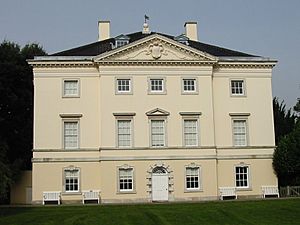Charles Augustus Tulk facts for kids
Charles Augustus Tulk (born 1786, died 1849) was an English politician and a follower of the ideas of Emanuel Swedenborg. He was known for his unique spiritual beliefs and his work on social issues.
Contents
Early Life and Education
Charles Augustus Tulk was born on June 2, 1786, in Richmond, Surrey. His father, John Augustus Tulk, was a wealthy man who was interested in the writings of Emanuel Swedenborg, a Swedish scientist and mystic.
Charles went to Westminster School, where he was a top student and known for his singing in the abbey choir. In 1806, he went to Trinity College, Cambridge.
When he turned 21 in 1807, Tulk received part of his father's property near Leicester Square in London. He sold the garden area in the Square in 1808. This sale later led to a very important legal case called Tulk v Moxhay. This case helped establish rules about how land can be used, even after it's sold, if there are special agreements called restrictive covenants.
After leaving university, Tulk studied to become a lawyer at Lincoln's Inn. However, because he had his own money, he didn't need to work as a lawyer. He lived in places like Marble Hill House from 1812 to 1817, and then moved to Totteridge Park.
Following Swedenborg's Ideas
In 1810, Tulk helped create a society in London to publish Swedenborg's books. He was part of its committee for many years. Even though he followed Swedenborg's ideas, Tulk never officially joined the New Church, which was based on Swedenborg's teachings. He preferred to hold private services for his family.
Tulk was also involved with the "Hawkstone meeting," a yearly gathering for people interested in Swedenborg's works. He led this meeting several times between 1814 and 1830.
Working for Social Change
Tulk cared a lot about improving the lives of factory workers. He wrote articles for newspapers to support their cause.
He became a member of Parliament (MP) for Sudbury in 1820 and served until 1826. Later, in 1835, he was elected MP for Poole and stayed in Parliament until 1837. His political views made him good friends with Joseph Hume, another politician.
Tulk was also an active local judge for Middlesex from 1836 to 1847. He was especially interested in how prisons and mental hospitals were run. He was chairman of the committee for the Hanwell asylum from 1839 to 1847. He was also against the death penalty.
Interests in Science and Art
Tulk had a deep interest in understanding Swedenborg's writings on a deeper, more philosophical level. He also studied science, especially chemistry and physiology, to explore his ideas. He became a Fellow of the Royal Society in 1822, which is a big honor for scientists.
He was interested in phrenology, a study that claimed to understand personality from the shape of the skull, and was president of the London Phrenological Society.
Tulk was friends with the famous poet Samuel Taylor Coleridge. Their letters show how Coleridge's ideas about nature developed. Tulk even involved Coleridge in his efforts to improve factory conditions, leading to the Cotton Mills, etc. Act 1819.
Tulk was also a supporter of the artist William Blake. He took Coleridge to see one of Blake's paintings, and Blake even made drawings for Tulk, though these are now lost. Some people believe Tulk wrote a positive review of Blake's life in a magazine. The poet Elizabeth Barrett Browning also learned about Blake through Tulk.
Later Years and Legacy
In 1847, Tulk traveled to Italy and returned in late 1848. He passed away in London on January 16, 1849, and was buried in Brompton cemetery.
Tulk wrote several works, including The Record of Family Instruction (1832) and an explanation of the Lord's Prayer (1842). He also started a major work called Spiritual Christianity but did not finish it.
Tulk married Susannah Hart in 1807, and they had twelve children. Five sons and two daughters survived him. His eldest son was Augustus H. Tulk. The land in Leicester Square that led to the famous legal case was divided among his children. Later, a politician named Albert Grant bought the land and turned the whole Square into a public park.
Works
- The Record of Family Instruction (1832)
- An exposition of the Lord's Prayer (1842)
- Aphorisms (1843)
- Spiritual Christianity (1846–47, unfinished)
 | John T. Biggers |
 | Thomas Blackshear |
 | Mark Bradford |
 | Beverly Buchanan |


